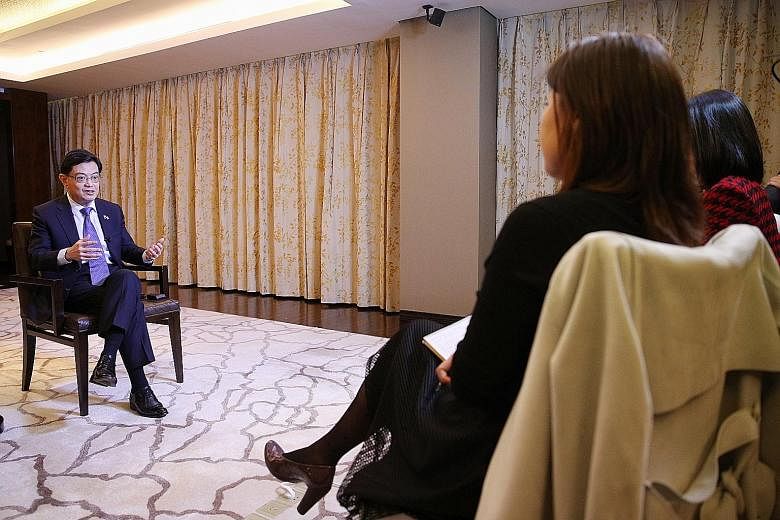As Singapore goes through a transition to a new team of leaders, these fourth-generation politicians have been nurturing a relationship with China to maintain continuity.
Preparatory work began when they were still junior ministers involved in various Singapore-China business councils, Deputy Prime Minister Heng Swee Keat, 57, said in reply to a question on how the 4G leadership will engage Beijing.
Mr Heng had led a team of Singapore's next cohort of leaders to attend the annual Joint Council for Bilateral Cooperation (JCBC) meeting, held in the south-western city of Chongqing on Tuesday.
Asked how confident the 4G team is in dealing with the Chinese leaders, especially given the disparity in age and political experience, Mr Heng cited the ministers' work in numerous bilateral councils.
"The engagements did not just start. The engagements have been going on for a while," he told Singapore reporters in an interview rounding up his four-day visit to China yesterday.
The JCBC, started in 2004, is the highest-level cooperation summit between the two countries and is co-chaired by their deputy prime ministers. Mr Heng's counterpart is Vice-Premier Han Zheng, 65, a member of the most powerful decision-making body, the Politburo Standing Committee.
Nine agreements were signed at the end of Tuesday's talks, including a youth internship exchange programme and a smart-city initiative with technology capital Shenzhen.
Besides being Mr Heng's first outing as co-chair since taking over from former deputy prime minister Teo Chee Hean, who is now Senior Minister, this year's talks are also significant, with as many as six 4G ministers, and two senior ministers of state and one minister of state, attending.
How can these younger leaders be more effective in engaging with China in the coming years?
"If you look back at the cooperation that we have had with China over the years, it has to be relevant to both countries' needs, and we have to bear in mind that whatever we do, Singapore must stay relevant and useful not just to China, but to the world," said Mr Heng, who was last in China only five months ago, when he visited four Chinese cities in a week. "And it is important for us to look at how we can play a role at the various stages of the different countries' development."
Both countries first collaborated by building the Suzhou Industrial Park 25 years ago. Today, there are two more inter-governmental projects: Tianjin Eco-city and Chongqing Connectivity Initiative.
As China shifts its focus from developing cities in isolation to regional development blueprints, Singapore is well-placed to tap new opportunities, including those under China's Guangdong-Hong Kong-Macau Greater Bay Area and the Beijing-Tianjin-Hebei regional plans.
Mr Heng said: "We have a very good head start because in many of these key regional development areas, we have had bilateral councils for a number of years now."
Singapore has eight business councils with China, including the Singapore-Shanghai Comprehensive Cooperation Council established in April. It is also keen to have more financial tie-ups, something the central banks of the two countries will be working on.
Turning to Singapore's next general election, Mr Heng said the ruling People's Action Party has been making preparations all along, and it now has a "fairly good slate of candidates".
As the party has a policy of regularly renewing its political office-holders and parliamentarians, it has been interviewing a wide range of potential representatives.
"Until the election itself, we will continue looking for candidates so we can have a stronger team in the coming years," he said, adding that the administration has been working since the last election to deliver what was promised to voters.
He cited taking care of seniors with the Merdeka Generation Package, changes to the education system and promoting lifelong learning, as well as extending the retirement and re-employment ages.
He said: "Ministers have been working very hard and very well to make sure Singapore remains relevant and useful, and we can continue to grow our economy, take care of our people, and provide better education, healthcare and housing."

